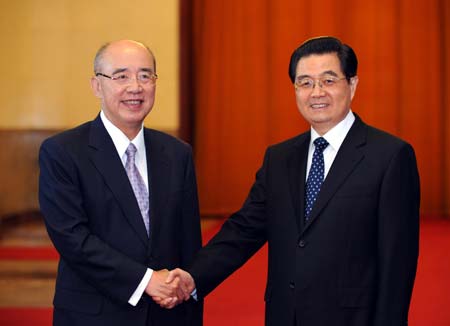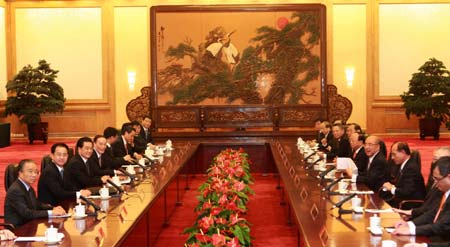BEIJING, May 26 (Xinhua) -- Hu Jintao, general secretary of the Communist Party of China (CPC) Central Committee, met with visiting Kuomintang (KMT) Chairman Wu Poh-hsiung here Tuesday, promising to kick-start talks on cross-Straits economic co-op pact and to avoid "internal struggle" in foreign affairs.
The two agreed to further implement the common prospects for peaceful cross-Straits development, agreed by leaders of the two parties in 2005, said a statement issued after their meeting.

Hu Jintao (R), general secretary of the Communist Party of China (CPC) Central Committee, meets with Kuomintang (KMT) Chairman Wu Poh-hsiung in Beijing, capital of China, on May 26, 2009.(Xinhua/Rao Aimin)
Both sides would maintain the political foundation that they oppose "Taiwan independence" and stick to the 1992 Consensus, the statement said. Both will "work to intensify mutual trust."
They would begin talks about the economic cooperation agreement as early as possible and promote exchanges between cultural and educational sectors, it said.

Hu Jintao (3rd L), general secretary of the Communist Party of China (CPC) Central Committee, meets with Kuomintang (KMT) Chairman Wu Poh-hsiung in Beijing, capital of China, on May 26, 2009.(Xinhua/Pang Xinglei)
AVOIDING "INTERNAL STRUGGLE"
"Both sides held that they should avoid internal struggle in foreign affairs and work for the interests of all Chinese," the statement said.
Taiwan's participation in the World Health Assembly (WHA) earlier this month showed the mainland's sincerity in pushing forward the peaceful development of cross-Straits relations, said Hu at the meeting with Wu.
"It indicated Chinese on both sides of the Taiwan Straits have the ability and wisdom to properly solve issues concerning the island's participation in activities of international institutions," he said.
"We hope it is conducive to promoting Taiwan compatriots' understanding on the mainland and the peaceful development of cross-Straits relations," he said.
ECONOMIC CO-OP TALKS EXPECTED
The mainland expects talks about a cross-Straits economic cooperation agreement to start in the latter half of this year, Hu said. "Both sides should push forward the preparation work for signing the agreement," Hu said.
In the near term, the mainland would continue focusing on economic cooperation, and the top priority was to jointly tackle the impact of the global downturn, he said.
"We have adopted some measures to pull through this crisis together with you [Taiwan people], as compatriots on the two sides of the Taiwan Straits belong to one family," he said. "We will continue doing this if the situation requires us to."
The mainland prefers an economic agreement that will benefit economic development on both sides, improve people's welfare and contribute to a cooperative mechanism that fits the cross-Straits reality, he said.
END HOSTILITY, REACH PEACE AGREEMENT
Promoting the formal end of cross-Straits hostility and reaching a peace agreement was the goal set forth by the common prospects for peaceful cross-Straits development, agreed by leaders of the two parties in 2005, Hu said.
The mainland proposed the two sides conduct pragmatic discussion on issues concerning political relations and establishing a mechanism of mutual trust on cross-Straits military security under the circumstances that the country has not been reunified, he said.
Cross-Straits negotiations should be conducted step-by-step and with a proper pace by putting economic and simple issues first and gradually moving on to tackle political and difficult problems, he said.
"The two sides, however, should be prepared and create conditions for solving these problems," he said. The two sides could start with contacts in "initial form" and accumulate experience to gradually tackle difficult issues.
MUTUAL TRUST HIGHLIGHTED
Mutual trust based on opposing "Taiwan independence" and sticking to the 1992 Consensus since last May helped solve a series of complicated problems in cross-Straits relations, Hu said.
Consolidating and promoting political mutual trust was especially important for developing future ties, including gradually solving some difficult political issues, he said. "Sticking to the principle that the mainland and Taiwan belong to one China is the key point."
Hu said the KMT and CPC shouldered historic responsibility in promoting peaceful development of cross-Straits ties.
Inter-party exchanges and dialogue, especially at high levels, would play an irreplaceable role in maintaining the momentum of development of cross-Straits relations, he said.
The CPC-KMT forum held since 2006 was a successful platform, Hu said. It should be continued and improved.
Hu also stressed grassroots people's role in pushing forward ties.
The Straits Forum held earlier this month had highlighted the participation and interaction between people across the Straits, he said.
Hu called for more effort to carry out cultural and educational exchanges across the Straits, saying there was both "great demand and potential."
POSITIVE RESPONSE FROM WU
Wu said that in the past year, the two sides had built mutual trust and shelved disputes, sought common ground while resolving differences and enhanced cooperation for peace, common prosperity and reciprocity.
"The fruitful achievements in the development of the cross-Straits relationship should be attributed to the two sides' political mutual trust, which are based on the adherence to the '1992 consensus' and opposing 'Taiwan independence'," he said.
Wu said the peaceful development of cross-Straits ties conformed to the expectations of people on both sides and the international community.
The majority of Taiwan people have felt the positive effects of the cross-Straits exchanges and consultations and become more supportive of the peaceful development of cross-Straits relations, he said.
"It has been proven that we're heading the right direction," Wu said. "We should and must go on in that direction."
He expressed the hope that both sides would further enhance mutual trust, solve differences and seek consensus, actively promote healthy interaction and steadily accumulate experience from solving problems to create together peace, stability, development and prosperity.
Amid the global downturn, the two sides should give each other more support, Wu said, adding that relevant departments of both two sides should accelerate work on signing the cross-Straits economic cooperation framework agreement and start consultations as soon as possible.
They should also deepen and expand cooperation in culture, education, academia, science and technology, sports, arts and among young people, he said.
The new round of the CPC-KMT forum, scheduled for July in Changsha, capital of the central Hunan Province, would highlight cultural and educational exchanges, Wu told a press conference Tuesday.
During the talks, Wu wished success for the Shanghai World Expo2010 and the Guangzhou Asian Games, while Hu also extended his best wishes to the World Games 2009 in Kaohsiung and the 21st Deaf Olympics in Taipei.
DIRECTION
Experts hail the statement issued by the two parties as pointing out a direction for the cross-Straits peaceful development in the future.
"Only when both sides continue to strengthen mutual political trust can we solve those hard problems in the cross-Straits economic and political issues," said Guo Zhenyuan, researcher from the China Institute of International Studies, referring to Hu's remarks on the importance of mutual political trust.
Guo said Hu's remarks on strengthening the cross-Straits education exchange was meaningful. "In order to improve a peaceful relationship, both sides must strengthen the cultural ties between the people, removing the negative effects some 'Taiwan-independence' groups have on the people on the island."
Wu Nengyuan, a Taiwan affairs researcher from the Fujian Provincial Academy of Social Sciences, said, "although now is not the right time to solve political issues, the two sides have already developed some kind of proximity."
He said in the future the two sides might hopefully understand each other more at an academic level and build up deeper trust.
"When the time comes, they will naturally talk about more," he added.
Wu Poh-hsiung arrived in Beijing Monday for an eight-day visit to the mainland. Wang Yi, director of the State Council Taiwan Affairs Office, said Monday that Wu's visit was the most important event in this year's cross-Straits relations.
Hu and Wu first met in Beijing last May 28, days after the KMT's Ma Ying-jeou was inaugurated as Taiwan leader.
They met again in August 2008 when Wu was invited to attend the opening ceremony of the Beijing Olympic Games.
|

